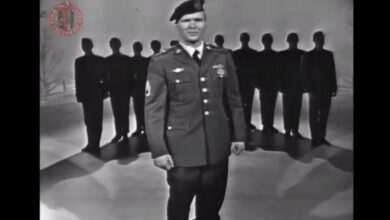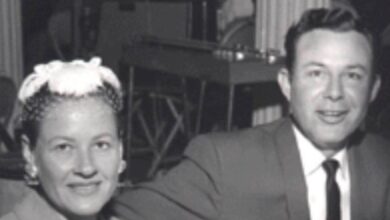Elvis Sings This Song With Immense Emotion, Priscilla Reveals
Elvis Presley, often hailed as the “King of Rock and Roll,” remains an inseparable part of music history and popular culture. Born in Tupelo, Mississippi, on January 8, 1935, he grew up in a modest household that valued music as a vital form of expression. His diverse musical influences included gospel from church, rhythm and blues from the local music scene, and country music. These genres coalesced into what would eventually become his unique rockabilly sound, a genre that blended these influences and laid the groundwork for rock and roll as we know it. As a teenager, he began performing locally, showcasing not only his voice but also his engaging personality, which would become a defining characteristic of his career.
In the mid-1950s, Elvis’s groundbreaking musical style and image caught the attention of producers and record labels, leading to his first major record deal. With the release of hits like “Heartbreak Hotel,” “Hound Dog,” and “Don’t Be Cruel,” he rapidly ascended to fame, captivating audiences with his energy and charisma. His revolutionary approach to music and performance, which combined powerful vocals with improvisational flair, helped Elvis bridge the gap between different musical genres, appealing not only to young people but also changing the cultural landscape of the time. As he became a household name, his influence extended beyond music to fashion, youth culture, and the burgeoning realm of television.
Elvis’s persona was characterized by a strong love for performance and an undeniable charm that resonated with fans worldwide. He was not only a singer but also a cultural icon who embodied the rebellious spirit of youth in the 1950s. His performances, often filled with energetic dance moves and passionate singing, were a departure from the more restrained styles of entertainment that preceded him. His ability to connect with audiences, particularly young people experiencing their own cultural revolutions, solidified his status as a revolutionary figure in the music industry.
Despite facing challenges such as public scrutiny and struggles with fame, Elvis continued to evolve as an artist. The late 1960s marked a significant turning point in his career when he staged a comeback with his famous “68 Comeback Special.” Initially perceived as a fading star, the special highlighted his enduring talent and adaptability. It was during this program that Elvis redefined himself, moving from the world of movie musicals back to the roots of live music performance. The special was a critical success, allowing him to rediscover his passion for live shows and reconnect with audiences in a meaningful way.
The performance of “If I Can Dream” during the “68 Comeback Special” became one of the defining moments of Elvis’s career. Written as a response to the challenging social climate of the time, the song encapsulated the hopes and dreams of many as America grappled with civil rights issues and political strife. Elvis’s heartfelt interpretation conveyed a message of unity and a yearning for a better future, showcasing not only his vocal talent but also his ability to convey deep emotion and take a stand on social issues through his music.
Clad in a striking black ensemble, Elvis’s presence onscreen was magnetic; he commanded attention with his passionate delivery and soulful performance. The choice of orchestration, coupled with stirring choir harmonies, amplified the song’s message, creating a profound listening experience that resonated with viewers. His performance exemplified not just entertainment but a poignant moment in American culture, highlighting the artist’s ability to transcend mere musicality and speak to the heart of societal issues.
In retrospect, the song “If I Can Dream” stands as a symbol of hope, reflecting Elvis’s desire for a world more united and filled with harmony. This moment extended beyond just his career; it resonated with an audience that witnessed a time of significant transformation. The song has since been interpreted as an anthem that calls for understanding and peace, echoing sentiments that remain relevant in contemporary discussions surrounding social justice and community.
Elvis’s legacy continues to thrive, reminding us of his ability to cross cultural and musical barriers. His use of music as a platform for advocacy highlights the significant role artists can play in society. Although he passed away in 1977, Elvis’s influence on future generations of musicians, performers, and the music industry as a whole is undeniable. Iconic figures across genres often cite him as a primary influence, underscoring his far-reaching impact.
In addition to his musical achievements, Elvis’s life story reflects the complexities of fame and personal struggles. He navigated an often tumultuous life marked by both tremendous success and personal challenges, including battles with addiction and health issues. Despite these hurdles, his dedication to his craft remained unwavering. His ability to reinvent himself throughout his career—whether through changing musical styles, exploring different genres, or adapting to the evolving tastes of audiences—demonstrates his resilience and creativity as an artist.
As time moves on, the music and performances of Elvis Presley live on, constantly reinvented and rediscovered by new audiences. He has become more than just a musician; he is a symbol of transformation, creativity, and above all, the power of music as a universal language. Through his body of work, Elvis Presley will forever hold a place in the annals of music history, continuing to inspire artists and fans alike with his timeless artistry and indelible spirit. His life and work serve as a reminder of the enduring impact one individual can have on the world, leaving behind a legacy that transcends generations and cultural divides.





